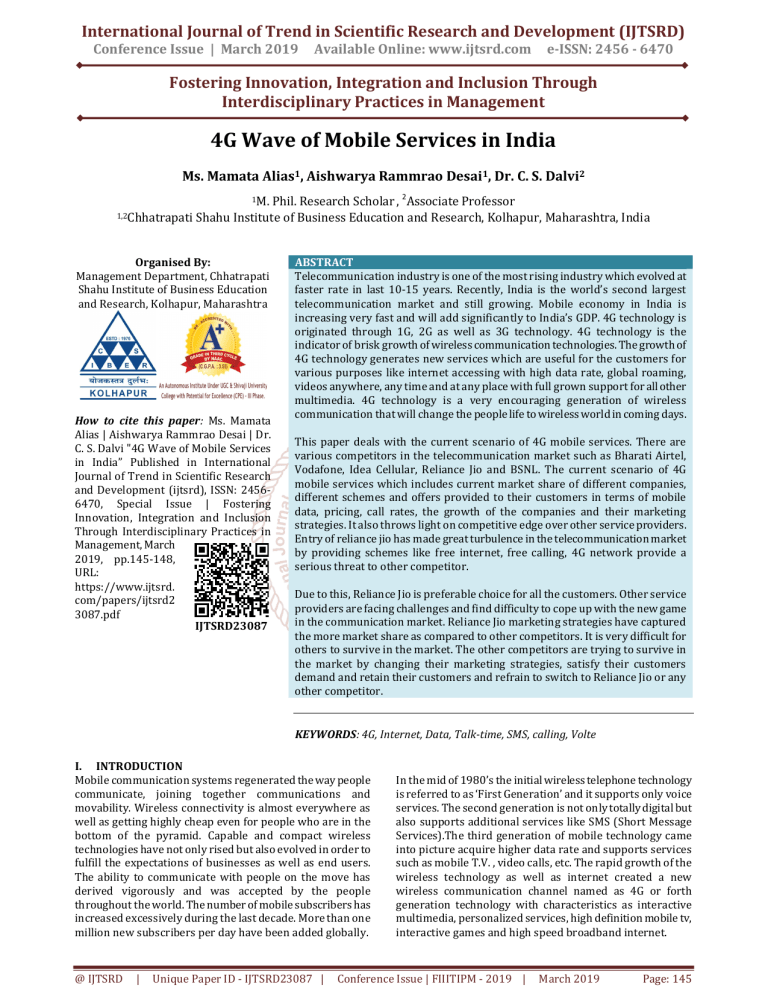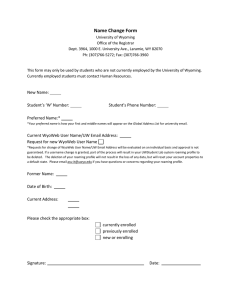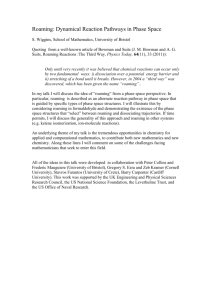
International Journal of Trend in Scientific Research and Development (IJTSRD) Conference Issue | March 2019 Available Online: www.ijtsrd.com e-ISSN: 2456 - 6470 Fostering Innovation, Integration and Inclusion Through Interdisciplinary Practices in Management 4G Wave of Mobile Services in India Ms. Mamata Alias1, Aishwarya Rammrao Desai1, Dr. C. S. Dalvi2 Phil. Research Scholar , 2Associate Professor 1,2Chhatrapati Shahu Institute of Business Education and Research, Kolhapur, Maharashtra, India 1M. Organised By: Management Department, Chhatrapati Shahu Institute of Business Education and Research, Kolhapur, Maharashtra How to cite this paper: Ms. Mamata Alias | Aishwarya Rammrao Desai | Dr. C. S. Dalvi "4G Wave of Mobile Services in India” Published in International Journal of Trend in Scientific Research and Development (ijtsrd), ISSN: 24566470, Special Issue | Fostering Innovation, Integration and Inclusion Through Interdisciplinary Practices in Management, March 2019, pp.145-148, URL: https://www.ijtsrd. com/papers/ijtsrd2 3087.pdf IJTSRD23087 ABSTRACT Telecommunication industry is one of the most rising industry which evolved at faster rate in last 10-15 years. Recently, India is the world’s second largest telecommunication market and still growing. Mobile economy in India is increasing very fast and will add significantly to India’s GDP. 4G technology is originated through 1G, 2G as well as 3G technology. 4G technology is the indicator of brisk growth of wireless communication technologies. The growth of 4G technology generates new services which are useful for the customers for various purposes like internet accessing with high data rate, global roaming, videos anywhere, any time and at any place with full grown support for all other multimedia. 4G technology is a very encouraging generation of wireless communication that will change the people life to wireless world in coming days. This paper deals with the current scenario of 4G mobile services. There are various competitors in the telecommunication market such as Bharati Airtel, Vodafone, Idea Cellular, Reliance Jio and BSNL. The current scenario of 4G mobile services which includes current market share of different companies, different schemes and offers provided to their customers in terms of mobile data, pricing, call rates, the growth of the companies and their marketing strategies. It also throws light on competitive edge over other service providers. Entry of reliance jio has made great turbulence in the telecommunication market by providing schemes like free internet, free calling, 4G network provide a serious threat to other competitor. Due to this, Reliance Jio is preferable choice for all the customers. Other service providers are facing challenges and find difficulty to cope up with the new game in the communication market. Reliance Jio marketing strategies have captured the more market share as compared to other competitors. It is very difficult for others to survive in the market. The other competitors are trying to survive in the market by changing their marketing strategies, satisfy their customers demand and retain their customers and refrain to switch to Reliance Jio or any other competitor. KEYWORDS: 4G, Internet, Data, Talk-time, SMS, calling, Volte I. INTRODUCTION Mobile communication systems regenerated the way people communicate, joining together communications and movability. Wireless connectivity is almost everywhere as well as getting highly cheap even for people who are in the bottom of the pyramid. Capable and compact wireless technologies have not only rised but also evolved in order to fulfill the expectations of businesses as well as end users. The ability to communicate with people on the move has derived vigorously and was accepted by the people throughout the world. The number of mobile subscribers has increased excessively during the last decade. More than one million new subscribers per day have been added globally. @ IJTSRD | Unique Paper ID - IJTSRD23087 | In the mid of 1980’s the initial wireless telephone technology is referred to as ‘First Generation’ and it supports only voice services. The second generation is not only totally digital but also supports additional services like SMS (Short Message Services).The third generation of mobile technology came into picture acquire higher data rate and supports services such as mobile T.V. , video calls, etc. The rapid growth of the wireless technology as well as internet created a new wireless communication channel named as 4G or forth generation technology with characteristics as interactive multimedia, personalized services, high definition mobile tv, interactive games and high speed broadband internet. Conference Issue | FIIITIPM - 2019 | March 2019 Page: 145 International Journal of Trend in Scientific Research and Development (IJTSRD) @ www.ijtsrd.com eISSN: 2456-6470 Finally, fourth generation is getting ready to blast the markets.LTE (Long Term Evolution) is developed to supply the increasing demands of higher data rates at decent costs. In spite of all the emerging technologies the final success of new mobile generations will be prescribed by the new services as well as contents made available to users. These new applications must meet users expectations and give added value over existing offers. In a simple way, 4G is successor of third generation (3G) mobile communication technology standard with higher capacity as well as performance. Many 3G networks in India could be shutdown. Operators and other players in the value chain need to mae LTE central to their plans and ensure the 3G equipment and services can be moved to 4G. With amazing advantage on technology, coverage devices and pricing, people expect 4G to become the preferred choice for Smartphone consumers. II. Marketing Strategies of different service provider companies: Here, marketing strategies of different service provider companies like Airtel, Idea, Vodafone and Reliance Jio respectively. A. Airtel: Airtel is the world’s 3rd largest mobile telecommunication Indian MNC operating in 20 countries across Asia and Africa. Airtel is Indian largest integrated telecom service provider. 1. Segmentation: Airtel uses segmentation strategies to segment it’s offerings like basic call/SMS plans, prepaid-postpaid plans, VAS-data, caller tunes, etc. Apart from geographically, segmenting the market in East, west, North, South and Central, the market is also segmented in each region on the basis of demographic variables like age, income, social groups. 2. Competitive advantage: Airtel has extended its infrastructure in the extreme parts of the country for nationwide penetration, creating competitive edge over other player in terms of low operational cost, better network connectivity, coverage, low call drops as well as better customer service. 3. Brand equity: High TOMA (top of mind awareness), ARPU (average revenue per user) and extensive distribution system and as high as 300+ million subscribers has helped Airtel in crafting market leader position for itself over the years. Along with this, airtel has moved from a technological brand to a communication brand through its continuous evolving branding and marketing efforts. 4. Market analysis: In the highly competitive telecom market where each company is trying hard to retain their customers and increase APRU(average return per user), Airtel is facing competition from small and local players. Also, players like Vodafone who are fighting head on to emerge as a market leader possess a serious threat to the company. B. Idea: Idea is a subsidiary brand of its parent company Aditya Birla Group. It is a public company of Indian origins. The idea is a @ IJTSRD | Unique Paper ID - IJTSRD23087 | mobile service provider and is associated with telecommunication industry. The idea has targeted upper middle and a middle class section of society like workers, student and laborers as it potential customers. 1. Product: Recently, it has launched 4G LTE services in several cities. It has strengthened its brand position after the launch of one of the most important schemes MNP. The product kit of idea includes SIM cards with postpaid and prepaid options, convenient call rates, value added services, SMS services, free incoming, GRPS services and roaming facilities. 2. Price: The Idea has adopted a competitive pricing plan as it faces competition with rival companies. Its product prices and service options are nearly same as rival companies, so that they can retain the loyalty of its customers. The company has kept its prices affordable and pocket friendly, so that its products and services are easily accessible to a common man. Prices are very reasonable because of lower call rates and launch of new schemes at periodic intervals. 3. Place: Idea has its headquarters base at Mumbai in Maharashtra. The idea has operations in places like Delhi, Rajasthan, Himachal Pradesh, Kerala, Goa, Haryana, Punjab, Utter Pradesh, Gujrat and Maharashtra. 4G LTE services are available in 10 telecom areas and are spread over three hundred and fifty towns. The Idea uses selective distribution network to distribute its products to consumers easily. 4. Promotion: Idea realises the impact of a good and strong marketing plan and hence has decided to follow an aggressive marketing strategy. During, its early days, it highlighted its value added services and tariff plans via ad campaigns because at the end of a day everyone appreciates a plan that will prove beneficial for him. C. Vodafone: With more than 470 million customers across the globe in mobile telephony, more than 13 million customers in fixed broadband and 10 million customers in cable TV, Vodafone is connecting people worldwide and making communications across different mediums convenient and secure. 1. Segmentation and Targeting: Vodafone uses a mix of segmentation strategies to segment its offerings in mobile network services, enterprise services and broadband service accordingly. It uses geographical, demographical, psychographic segmentation. Vodafone is targeting different sections of the societies with their different offerings. Therefore, it uses selective and differentiated targeting strategies. 2. Competitive advantage: Its various products and services such as Vodafone portrait, Vodacom, m-pesa, Vodafone speech mark has helped the company in being competitively ahead of its competitors in the respective market. Conference Issue | FIIITIPM - 2019 | March 2019 Page: 146 International Journal of Trend in Scientific Research and Development (IJTSRD) @ www.ijtsrd.com eISSN: 2456-6470 3. Distribution strategy: It operates in Europe, Asia pacific and the middle east. Vodafone reaches to its customer through a variety of channels such as retail outlets, Vodafone exclusive stores, distribution partners and through online medium. 4. Competitive analysis: The telecommunications industry is competitive with the large number of the mobile telephone, TV cable and fixed line providers competing in the interrelated industry. Vodafone has differentiated its services from the other 12 major telecom companies through its array of offerings high quality network, infrastructure helped it in capturing a high share of wallet of the customers. D. Reliance Jio: Indian telecom sector is becoming backbone for fast growing Indian economic of this decade. Jio came up in Indian telecom sector with a idea to make huge revenue by providing quality service at a very cheaper rate. It came with advantage of first biggest 4G network coverage across all 22 telecom circles in India. 1. Acquisition: Reliance Jio has captured the market by providing“ everything for free”. Free data, voice calling, video, music, content, roaming and bouquet of applications and even free SIMs. 2. Activation: Reliance Jio is 100% VoLTE network. It means we make voice calls on data network. VoLTE enabled Jiosim is activated in a day. Providing Aadhar card number can activate your jiosim in only 15 minutes. 3. Retention: Once the customer has subscribed for the network and has started using the same, the next step is to retain him comfortable with jio’s features and services. The goal is to engage him with the product for a long run. Earlier the free data and calling was given dec.2016. however, it was extended to March 2017 to built customer retention and make them habitual of the existing services. Reliance Jio ended up becoming the first ever telecom company to provide 6 months of unlimited free data and calling services. 4. Referral: Before customers started buying reliance jiosims, one hardly saw any advertisement of the brand on TV, radio, newspapers, etc. There seemed to be no promotional activities for reliance jio, no brand ambassador, no approaching celebrities to help sell their product. Jio used the best form of promotion i.e. referral. Customers themselves were the promotional tools. When one subscriber used the sim and referred it to his friends, family, the jio family started increasing. III. Schemes and Offers: Now, herewith the schemes and offers of the different service provider companies such as airtel, idea, Vodafone and reliance jio under Rs. 500. A. Airtel: Rs. 93 169 197 179 349 399 448 Rs. 93 198 357 Data/day & SMS/day 1 GB 1 GB 1.4 GB, 100 1 GB, 100 2.5 GB, 100 1 GB, 100 1.4 GB Data & SMS/day 1 GB, 100 1.5 GB, 100 2 GB, 100 Calling Unlimited and free local & STD, roaming calls Unlimited and free local & STD, roaming calls Unlimited and free local & STD, roaming calls Unlimited and free local & STD, roaming calls Unlimited and free local & STD, roaming calls Unlimited and free local & STD, roaming calls Unlimited and free local & STD, roaming calls B. Idea: Calling Unlimited and free local & STD, roaming calls Unlimited and free local & STD, roaming calls Unlimited and free local & STD, roaming calls Validity 28 days 28 days 28 days 28 days 28 days 70 days 82 days Validity 10 days 28 days 28 days C. Vodafone: Rs. 21(Super hour plan) 198 349 399 458 Rs. 19 49 52 98 149 @ IJTSRD | Data & SMS/day Unlimited 4G 1.4 GB, 100 2.5 GB 1 GB, 100 1.4 GB Data & SMS/day 0.15GB 1 GB 1.05GB 2 GB, 300 1.5 GB, 100 Calling Unlimited and free local & STD, roaming calls Unlimited and free local & STD, roaming calls Unlimited and free local & STD, roaming calls Unlimited and free local & STD, roaming calls Unlimited and free local & STD, roaming calls D. Reliance Jio: Calling Unlimited and free local & STD, roaming calls Unlimited and free local & STD, roaming calls Unlimited and free local & STD, roaming calls Unlimited and free local & STD, roaming calls Unlimited and free local & STD, roaming calls Unique Paper ID - IJTSRD23087 | Conference Issue | FIIITIPM - 2019 | Validity 1 hour 28 days 28 days 70 days 84 days Validity 1 day 28 days 7 days 28 days 28 days March 2019 Page: 147 International Journal of Trend in Scientific Research and Development (IJTSRD) @ www.ijtsrd.com eISSN: 2456-6470 198 299 349 398 399 448 449 498 IV. Market share companies: of 2 GB 3 GB 1.5 GB 2 GB 1.5 GB, 100 1.9 GB 1.4 GB 2 GB different Unlimited and free local & STD, roaming calls Unlimited and free local & STD, roaming calls Unlimited and free local & STD, roaming calls Unlimited and free local & STD, roaming calls Unlimited and free local & STD, roaming calls Unlimited and free local & STD, roaming calls Unlimited and free local & STD, roaming calls Unlimited and free local & STD, roaming calls service provider 28 days 28 days 70 days 70 days 84 days 84 days 91 days 91 days V. Conclusion: As we know, evolution of 4G is take place. A strict competition begins among the different service provider companies to servive in the market. The companies try to satisfy their customers by fulfilling their requirements to retain them. The entry of jio disturbs the market as they provide various schemes at affordable rates. But, now the plans and offers of almost all companies are same. VI. References: [1] Press releases on subscriber data, March 2018. Telecom Regulatory Authority of India. www.trai.gov.in Source:- TRAI, India This is the market share of different service provider companies in the year 2017. The market share of Reliance share is more i.e. 39.60% as compared to the other companies like Vodafone, Idea, Airtel, etc. This diagram shows the addition in wireless subscribers of different service providers in the month of april, 2018. [2] Philip Kotler. Marketing Management – Analysis, Planning, Implementation, and Control,(8th ed.). Prentice Hall of India, New Delhi, p. 444 [3] Philip Kotler, Kevin Lane Keller, Abraham Koshy and MithileshwarJha. (2009). Marketing Management-A South Asian Perspective (13th ed.). Pearson Education, New Delhi, pp. 462-463. [4] reliancejio-4gairtel-vodafone-best-free-4g-dataplans retrieved from http://www.financialexpress.comreliance [5] how-mobilecompanies-are-fighting-jioeffect retrieved from http://www.timesnow.tv/business-economy Copyright © 2019 by author(s) and International Journal of Trend in Scientific Research and Development Journal. This is an Open Access article distributed under the terms of the Creative Commons Attribution License (CC BY 4.0) (http://creativecommons.org/licenses/by/4.0) @ IJTSRD | Unique Paper ID - IJTSRD23087 | Conference Issue | FIIITIPM - 2019 | March 2019 Page: 148



